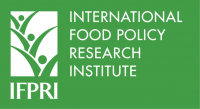
When people think of farm inputs, they often think of factors such as fertilizers and seeds. However, more important than all these inputs is something much simpler : water. Water is a vital resource for wing crops, but erratic or scarce rainfall in many parts of the world significantly constricts crop and livestock production. Water is also vitally important to human health and wellbeing. Access to clean water for drinking and hygiene can prevent diseases like diarrhea and parasite infections, and the use of irrigation can help farmers grow more nutritious fruits and vegetables and can stabilize food production and availability during dry seasons.
In Africa south of the Sahara (SSA), more than 60 percent of the population lives in rural areas where rainfed agriculture is the main or only source of livelihood. Only 6 percent of SSA’s cultivated area is currently irrigated.. A recent IFPRI discussion paper by Laia Domènech, “ Is Reliable Water Access the Solution to Undernutrition? A Review of the Potential of Irrigation to Solve Nutrition and Gender Gaps in Africa South of the Sahara ”, argues that there is great potential for expanding irrigation in Africa south of the Sahara and that such development could have important ramifications for undernutrition in the region.
Although the link between water quality and health has been made clear, the study cautions that the existing literature does not provide sufficient evidence to definitively link irrigation to improved nutrition outcomes. However, Domènech does identify several ways in which which irrigation can likely improve the welfare of poor populations in SSA. First, irrigation can help provide more diverse, nutritious diets through increased agricultural productivity and crop diversification. Irrigation can also help generate more income because increased productivity will lead to increased market sales and employment generation. Finally, irrigation can empower rural women by increasing their ownership of assets and their control over natural resources, and by reducing their time spent on water collection for farms and domestic use.
Domènech also lays out six factors that she believes can be used to make irrigation development programs more nutritionally-focused:
- Food security and nutrition should be included in the stated goals of irrigation programs;
- Training programs and awareness campaigns should be conducted in conjunction with irrigation interventions. These campaigns should promote more nutritious food production and consumption and highlight how clean water can minimize health risks;
- Irrigation water’s multiple uses, such as for drinking water and sanitation, should be emphasized;
- Women’s empowerment and women’s participation in irrigation programs should be promoted;
- Homestead food production should be encouraged; and
- Coordination among different sectors, such as agriculture, nutrition, health, water supply and sanitation, and education, should be encouraged.
